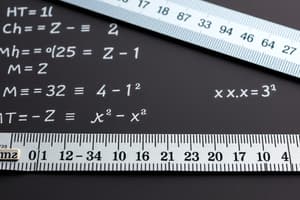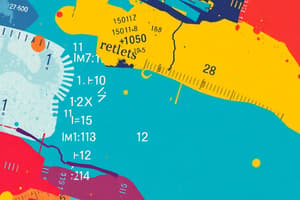Podcast
Questions and Answers
What are the meanings for the metric prefixes milli, centi, and kilo?
What are the meanings for the metric prefixes milli, centi, and kilo?
- Milli means one million, centi means one thousandth, kilo means one hundred.
- Milli means one thousandth, centi means one hundredth, kilo means one thousand. (correct)
- Milli means one hundredth, centi means one thousand, kilo means one million.
- Milli means one, centi means one hundred, kilo means one thousand.
The 0.3 g rock is heavier than the 30.0 mg rock.
The 0.3 g rock is heavier than the 30.0 mg rock.
True (A)
Which of the following numbers is the most precise measurement of a football field supposed to be 100.0 yards long?
Which of the following numbers is the most precise measurement of a football field supposed to be 100.0 yards long?
- 113.1 yards
- 1.0 x 10^2 yards
- 99.126 yards (correct)
Which number is the most accurate measurement?
Which number is the most accurate measurement?
What can we conclude about the density of the bobber compared to the density of the water if it floats?
What can we conclude about the density of the bobber compared to the density of the water if it floats?
What is the equation for density?
What is the equation for density?
What is the first law of thermodynamics?
What is the first law of thermodynamics?
Explain the difference between kinetic and potential energy and give an example of each.
Explain the difference between kinetic and potential energy and give an example of each.
What is the relationship between a food Calorie and a chemistry calorie?
What is the relationship between a food Calorie and a chemistry calorie?
If the temperature of an object starts to increase, is the object gaining or losing energy?
If the temperature of an object starts to increase, is the object gaining or losing energy?
What two units do we use for measuring energy?
What two units do we use for measuring energy?
How do you measure heat?
How do you measure heat?
What are two ways to measure heat?
What are two ways to measure heat?
If lead, plastic, and stone are given the same amount of energy, which will end up the hottest?
If lead, plastic, and stone are given the same amount of energy, which will end up the hottest?
Why do many recipes recommend boiling food at a constant temperature of 212 °F (100 °C)?
Why do many recipes recommend boiling food at a constant temperature of 212 °F (100 °C)?
What are the basic components of a calorimeter?
What are the basic components of a calorimeter?
What equation do you use for calorimetry?
What equation do you use for calorimetry?
If a substance can be decomposed, is it an element or a compound?
If a substance can be decomposed, is it an element or a compound?
If a substance can conduct electricity when dissolved in water, what do we classify it as?
If a substance can conduct electricity when dissolved in water, what do we classify it as?
What is the continuous theory of matter?
What is the continuous theory of matter?
What is the discontinuous theory of matter?
What is the discontinuous theory of matter?
What is the law of mass conservation?
What is the law of mass conservation?
What is the law of definite proportions?
What is the law of definite proportions?
What is the law of multiple proportions?
What is the law of multiple proportions?
A substance that is brittle and does not conduct electricity is most likely a metal.
A substance that is brittle and does not conduct electricity is most likely a metal.
Flashcards are hidden until you start studying
Study Notes
Metric Prefixes
- Milli: one thousandth (0.001)
- Centi: one hundredth (0.01)
- Kilo: one thousand (1,000)
Weight Comparison
- A 0.3 g rock is heavier than a 30.0 mg rock (30.0 mg = 0.03 g).
Measurement Precision and Accuracy
- Data on a football field's length:
- 113.1 yards
- 1.0 x 10² yards
- 99.126 yards
- B (1.0 x 10² yards) is the most accurate measurement.
- C (99.126 yards) is the most precise measurement.
Density Observations
- A fishing bobber floating indicates its density is less than that of water.
Density Equation
- Density formula: density = mass/volume
First Law of Thermodynamics
- Energy cannot be created or destroyed; it can only transform.
Energy Types
- Potential energy: stored energy (e.g., an unlit match).
- Kinetic energy: energy of motion (e.g., a lighted match).
Energy Units Relationship
- One food Calorie = 1,000 chemistry calories.
Energy Gain/Loss
- If an object's temperature increases, it is gaining energy.
Energy Measurement Units
- Energy is measured in joules and calories, with 1 calorie = 4.184 joules.
Heat Measurement Equation
- Heat is measured as q = mcΔT.
Heat Measurement Methods
- Celsius to Fahrenheit conversion: C = 5/9(F - 32).
- Kelvin conversion: K = C + 273.15.
Specific Heat Comparison
- If equal masses of lead, plastic, and stone are given the same energy, lead will end up the hottest.
Boiling Point in Cooking
- Cooking at 212 °F (100 °C) boils water, maintaining constant temperature while boiling.
Calorimeter Components and Experiment
- Basic components: insulated container, water, thermometer, stirring rod, and a heat-absorbing or emitting object.
- A calorimetry experiment measures energy changes and specific heat based on the change in water temperature.
Calorimetry Equation
- Calorimetry relation: -q_object = q_water + q_calorimeter.
Compound vs. Element
- A substance that can be decomposed is classified as a compound.
Conductivity Classification
- A substance that conducts electricity in water is classified as ionic.
Matter Theories
- Continuous theory: matter can be divided indefinitely, implying long, unbroken substances.
- Discontinuous theory: matter consists of tiny, individual particles.
Laws of Chemistry
- Law of mass conservation: Matter cannot be created or destroyed; it only changes form.
- Law of definite proportions: The element proportions in a compound remain constant.
- Law of multiple proportions: Different compounds from two elements will have mass ratios represented as simple whole numbers.
Material Properties
- A brittle, non-conductive substance is likely a nonmetal.
Studying That Suits You
Use AI to generate personalized quizzes and flashcards to suit your learning preferences.




